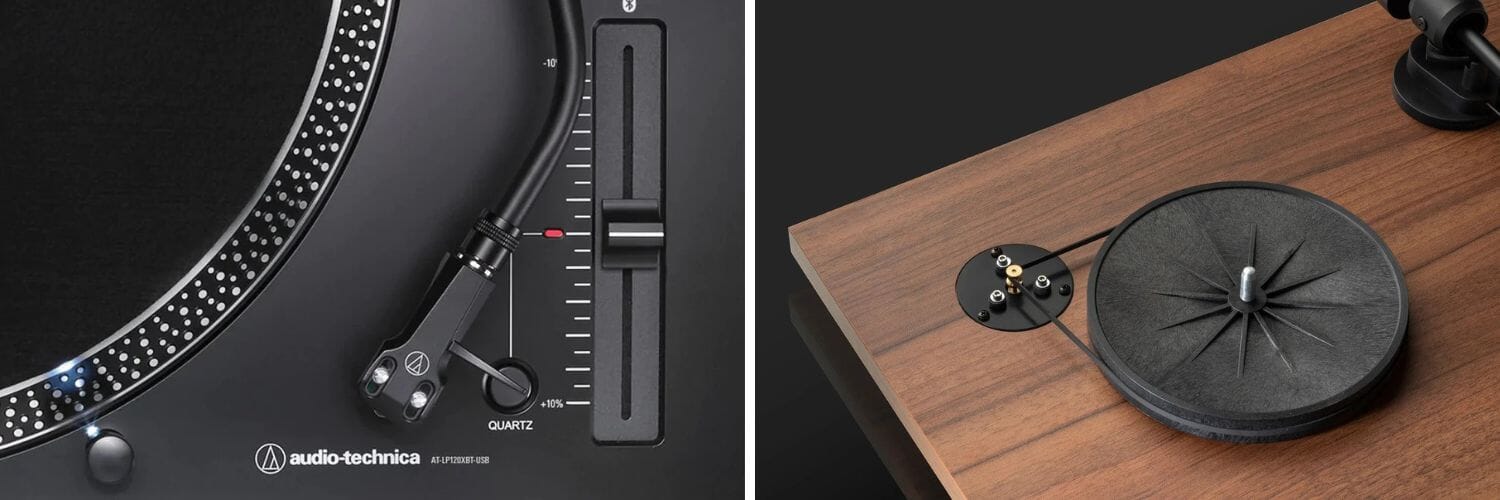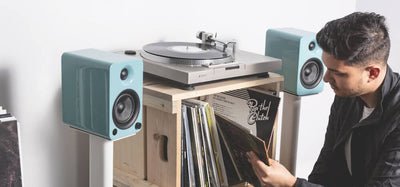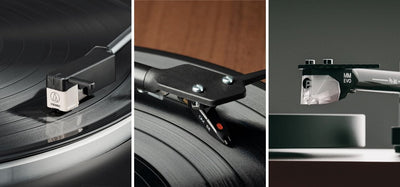“Vinyl is a very satisfying medium. I love the ritual. Putting the needle down on a record is a bit like lighting incense or candles.” – John Darnielle
For anyone drawn into the world of vinyl, there’s no denying the charm and tactile pleasure of spinning records.
But once you've made the decision to dive into turntables and record players, you face the crucial question: belt-drive or direct-drive?
The answer depends on how you plan to use it. Are you a casual listener seeking rich sound, or do you envision yourself scratching records at your house party?
Let’s break down the differences to help you make the right choice.
Understanding the Basics
Before we dive into the pros and cons it's essential to understand the mechanical difference between the two types of turntable.
In a belt-drive turntable, the motor is positioned off to the side, and a rubber belt connects the motor to the platter (the part that holds the record).

In contrast, a direct-drive turntable has the motor placed directly under the platter, with the platter sitting on top of the motor itself.

This difference in design has an impact on performance, durability, and how the turntable feels in use.
Belt-drive systems rely on the elasticity of the belt to reduce vibrations, making them great for home listeners who crave high-fidelity sound.
Most of the turntables you’ll find on our website are belt drive as it’s the most common type for home audio.
On the other hand, direct-drive models are designed for DJs and other users who need immediate start-up times and precision control.
You’ll find some good home/DJ turntables such as the Audio-Technica LP120XBT-USB which has some great features for both home audio and home DJ use.
The Case For Belt-Drive Turntables
1. Sound Quality
Audiophiles tend to favour belt-drive turntables for their superior sound quality.
The belt helps isolate the platter from the motor, minimising vibration and noise interference, leading to clearer audio.
If your primary goal is to immerse yourself in music and capture every nuance, a belt-drive turntable will likely be your best friend.
This design reduces the chance of mechanical noise bleeding into the signal, which is crucial if you're playing in a quiet, controlled environment.
The separation between the motor and the platter adds a layer of isolation that helps minimise unwanted hums and buzzes.

2. Price
While there are high-end models in both categories, belt-drive turntables tend to be more affordable for beginners.
The simpler mechanical design means manufacturers can focus more on other elements, like the tonearm and cartridge, while keeping costs down.
For someone just getting into vinyl, a belt-drive turntable offers an accessible starting point without sacrificing sound quality.
3. Maintenance & Longevity
Belt-drive systems are relatively easy to maintain.
The most common issue is the eventual wear and tear on the belt itself, which will need replacing after years of use.
But don’t worry, replacement belts are inexpensive, readily available and really easy to replace.
Moreover, the less direct mechanical interaction between the motor and the platter generally means less wear on the moving parts, contributing to the overall longevity of the turntable.
Read More: How Long Does A Turntable Belt Last? (And How To Replace It)
4. Design For Audiophiles
Belt-drive turntables often have a more minimalist, retro aesthetic, making them highly appealing for home setups where design matters just as much as functionality.
Many people prefer the look and feel of belt-drive systems, which often come with heavier platters to maintain consistent speeds and enhance sound performance.
The Case For Direct-Drive Turntables

1. Instant Response & Torque
If you’re thinking of becoming a home DJ then direct-drive is the way to go.
One of the key strengths of a direct-drive system is its fast start-up time.
Because the platter is directly connected to the motor, you get an immediate response when you hit the play button. DJs value this because it allows them to make quick adjustments and mix tracks seamlessly.
The high torque of direct-drive systems means the platter reaches optimal speed almost instantly, perfect for precise cueing, scratching, and back-cueing.
This instant control is essential for live performances, where timing is everything.
2. Durability
Direct-drive turntables are designed to be rugged.
The direct connection between the motor and the platter ensures there are fewer moving parts that can wear out over time.
If you're planning to transport your turntable frequently or use it in settings where it might face heavy usage (clubs, parties, etc.), a direct-drive model will better withstand the demands of constant use.
3. Pitch Control & Speed Stability
Direct-drive turntables come with a pitch control slider, which allows DJs to fine-tune the speed of the record by small percentages.
This level of precision is indispensable for beatmatching, a technique where DJs synchronise the tempos of two records.
Additionally, direct-drive systems tend to have more stable and consistent speeds, as there's no belt to stretch or degrade over time.
4. Minimal Maintenance
Unlike belt-drive systems, where the belt needs occasional replacement, direct-drive turntables require little to no maintenance.
Since the motor is directly integrated into the platter, there's less wear on individual parts, meaning they generally have a longer operational lifespan without much attention.
The Downsides of Each
While both systems have their advantages, neither is perfect.
Belt-drive turntables can suffer from belt slippage or wear over time, which may result in slight speed inconsistencies. Additionally, the elastic nature of the belt means you won't have the immediate torque required for techniques like scratching.
For direct-drive turntables, the proximity of the motor to the platter can sometimes result in increased vibrations, which might lead to slight noise interference, though this is less of an issue in high-end models.
Direct-drive systems also tend to be bulkier and more expensive, making them less ideal for casual home listening setups.
Which One Is Right for You?
The choice between a belt-drive and direct-drive turntable boils down to how you intend to use it. Here’s a quick recap:
- Belt-Drive: Best for audiophiles and home listeners who prioritise sound quality and affordability. If you're in it purely for the music and want a clean, immersive listening experience, this is the better option. It’s perfect for long listening sessions where subtle nuances in sound matter.
- Direct-Drive: Best for budding DJs or anyone looking to manipulate records in real time. If you're planning on mixing, scratching, or need precise control over pitch and speed, go for a direct-drive model. It’s built to endure heavy usage and provides the torque and precision essential for live performances.
If you're just starting out and don’t need the extra functionality of a direct-drive system, a belt-drive turntable is likely the way to go.
However, if you envision a future where you might dabble in DJing, investing in a direct-drive system may save you from having to upgrade later.
Final Thoughts
Whether you choose a belt-drive or direct-drive turntable depends on your listening habits, goals, and budget.
If you're leaning towards a purist, audiophile experience like most of our readers and customers then a belt-drive model will likely offer the sound quality and aesthetic you’re looking for.
On the other hand, if you’re after versatility, precision, and the ability to play records as an instrument, the direct-drive turntable is your best bet.
Whichever you choose, remember that the joy of vinyl lies not just in the machine, but in the experience of dropping that needle and letting the music take you away.





